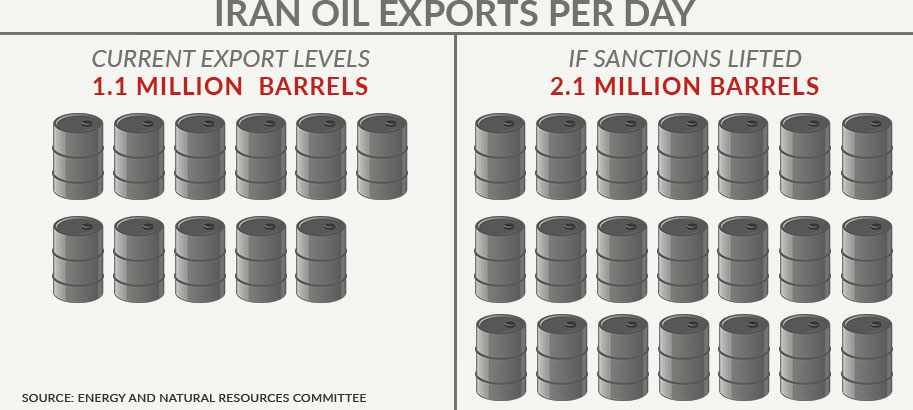Lift Sanctions on American Oil
-
Lifting sanctions on Iranian oil exports and not lifting sanctions against American oil exports empowers Iran while hurting America and its allies.
-
A Senate Energy and Natural Resources Committee report notes: “Many U.S. allies and trading partners are interested in purchasing American oil to diversify away from Russia, Iran, and other problematic sources.”
-
The oil export ban is a de facto sanctions regime against U.S. oil producers.
This morning, six major powers including the United States announced an agreement to initiate curbs on Iran’s nuclear program in return for sanctions relief, including on Iran’s crude oil exports. This could allow the country to export up to one million barrels of additional crude oil per day, according to the Energy Information Administration. As a June 23 report by the Energy and Natural Resources Committee noted, “lifting sanctions will boost Iranian oil exports at a time when federal law and regulations generally prohibit American oil exports.”
The report continued: “When those sanctions are lifted, the rise in global supply will put downward pressure on global prices. The net effect will be to negatively impact oil production in the United States ... In short, the general prohibition on exporting domestic crude oil amounts to a de facto sanctions regime against U.S. producers. Lifting sanctions against Iran without also lifting the ban on U.S. exports will allow Iran to compete in markets largely inaccessible to American companies.”

A June 27 article in USA Today described Obama administration officials as saying that increased U.S. oil production made the Iranian sanctions possible in the first place. The article noted: “By adding several million barrels per day to oil markets and pushing down prices, U.S. shale provided the room for cutting off Iranian oil without choking the global economy.”
Diversifying Away from Russia and Iran
In an earlier report published on June 9, the ENR Committee found that Washington could render vital assistance to U.S. allies by authorizing crude oil exports. It said that while legislative efforts to repeal the crude oil export ban progress, the administration should use its broad authority to grant requests for exemptions by allied countries. Substantial precedent exists for such exemptions and a national interest finding by the president could be implemented immediately.
That report stated: “Many U.S. allies and trading partners are interested in purchasing American oil to diversify away from Russia, Iran, and other problematic sources. Allowing such shipments would send a powerful signal of support and reliability at a time of heightened geopolitical tensions in much of the world. The mere option to purchase U.S. oil would enhance the energy security of countries such as Poland, Belgium, the Netherlands, India, Japan, and South Korea, even if physical shipments did not occur.” Poland receives 96 percent of its oil from Russia; Belgium receives 60 percent from Russia and Saudi Arabia; the Netherlands receives 31 percent from Russia; India receives 69 percent from the Middle East; Japan receives 75 percent from Russia and the Middle East; and South Korea receives 78 percent from the Middle East.
Congressional Support
On April 14, the chairmen of the Energy and Natural Resources, Armed Services, and Foreign Relations committees wrote an op-ed in Foreign Policy magazine highlighting the national security benefits of lifting the current U.S. prohibition on crude oil exports. Senators Murkowski, McCain, and Corker argued that the U.S. can help its allies and undermine its adversaries if it gets rid of the antiquated crude oil export ban. “There is simply no reason – legal, political or economic – for our nation to refuse to sell energy to our friends and allies.”
The Senators noted that past administrations, led by presidents from both parties, used executive authority to boost exports of refined products and crude oil. They committed their full support should President Obama make such a determination today. They also provided a historical analogy to emphasize the urgency of lifting the crude oil export ban, recounting the support American energy gave allied countries during the Suez Canal crisis of the mid-1950s.
On May 19, Leon Panetta, former secretary of defense in the Obama administration, and Stephen Hadley, national security adviser in the Bush administration, teamed up to write an opinion piece in the Wall Street Journal explaining how the crude oil export ban harms national security. While the U.S. has managed to break free from dependence on energy from unstable sources, “our friends and allies, particularly in Europe, do not enjoy the same degree of independence,” they wrote. “Most ominous is Russia’s energy stranglehold on Europe,” a situation that “leaves Europe vulnerable to Kremlin coercion,” they continued. A remedy for this is “a powerful, nonlethal tool: America’s abundance of oil and natural gas.”
Next Article Previous Article
